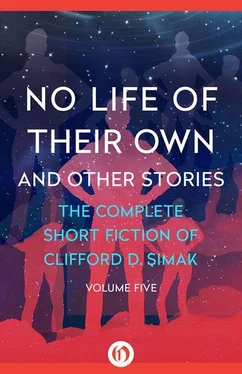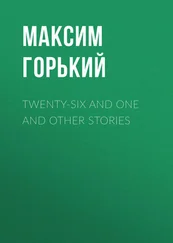There had, of course, been a few notable, but not spectacular exceptions. There had been Molly Parker, who had been sentenced to the ducking stool because she talked too freely about certain neighbors. There had been Jonathon, who had been sentenced to the colonies because he had the bad judgment of having fallen into debt. There had been a certain Teddy Parker, a churchman of some sort (the evidence was not entirely clear), who had fought a prolonged and bitter battle in the court with a parishioner over pasture rights held by the church which had been brought into question.
But these were minor matters. They scarcely caused a ripple on the placidity of the Parker tribe.
It was time to leave, he told himself. He had tracked the family, or this one branch of the family, down to this high ridge. He had found the old homestead, the house burned many years ago, now marked only by the cellar excavation, half filled with the litter of many years. He had seen the windmill and had stood beside the whistling well, which had not whistled for him.
Time to leave, but he did not want to leave. He felt a strange reluctance at stirring from this place. As if there were more to come, more that might be learned—although he knew there wasn’t.
Was this reluctance because he had fallen in love with this high and windy hill, finding in it some of the undefinable charm that must have been felt by his great-great-grandfather? He had the feeling of being trapped and chained, of having found the one place he was meant to be. He had, he admitted to himself, the sense of belonging, drawn and bound by ancestral roots.
That was ridiculous, he told himself. By no matter what weird biochemistry within his body he had come to think so, he could have no real attachment to this place. He’d give himself another day or two and then he’d leave. He’d make that much concession to this feeling of attachment. Perhaps, by the end of another day or two, he’d have enough of it, the enchantment fallen from him.
He pushed the fire more closely together, heaped more wood upon it. The flames caught and flared up. He leaned back in his camp chair and stared out into the darkness, beyond the firelit circle. Out in the dark were darker humps, waiting, watching shapes, but they were, he knew, no more than clumps of bushes—a small plum tree or a patch of hazel. A glow in the eastern sky forecast a rising moon. A quickening breeze, risen after the sunset calm, rattled the leaves of the big cottonwood that stood above the camp.
He scrooched around to sit sidewise in the chair and when he did, the gizzard stones in his jacket pocket caught against the chair arm and pressed hard against his hip.
Reaching a hand into his pocket, he took them out. Flat upon his palm, he held them out so the firelight fell upon them. He rubbed a thumb against them. They had the feel and look of velvet. They glistened in the dancing firelight. The gloss on them was higher than was ever found in the polished pebbles that turned up in river gravel. Turning them, he saw that all the depressions, all the concave surfaces, were as highly polished as the rest of the stone.
The stones found in river gravel had obtained their polish by sand action, swirling or washed along the riverbed. The gizzard stones had been polished by being rubbed together by the tough contracting muscles of a gizzard. Perhaps some sand in the gizzard, as well, he thought, for in jerking up a plant from sandy soil, the dinosaur would not be too finicky. It would ingest the sand, the clinging bits of soil, along with the plant. For years, these stones had been subjected to continuous polishing action.
Slowly, he kept turning the stones with a thumb and finger of the other hand, fascinated by them. Suddenly, one of them flashed in the firelight. He turned it back and it flashed again. There was, he saw, some sort of an irregularity on its surface.
He dropped the other two into his pocket and leaned forward toward the fire with the one that had flashed lying in his palm. Turning it so that the firelight fell full upon it, he bent his head close above it, trying to puzzle out what might be there. It looked like a line of writing, but in characters he had never seen before. And that had to be wrong, of course, for at the time the dinosaur swallowed the stone, there had been no such thing as writing. Unless someone, later on, within the last century or so—He shook his head in puzzlement. That made no sense, either.
With the stone clutched in his hand, he went into the camper, rummaged in a desk drawer until he found a small magnifying glass. He lit a gas lantern and turned it up, placed it on the desk top. Pulling over a chair, he sat down, held the stone in the lantern light, and peered at it through the glass.
If not writing, there was something there, engraved into the stone—the engraving worn as smooth and sleek as all the rest of it. It was no recent work. There was no possibility, he told himself, that the line that resembled engraving could be due to natural causes. He tried to make out exactly what it was, but in the flicker of the lantern, it was difficult to do so. There seemed to be two triangles, apex pointing down in one, up in the other and the two of them connected midpoint by a squiggly line.
But there was as much as he could make of it. The engraving, if that was what it was, was so fine, so delicate, that it was hard to see the details, even with the glass. Perhaps a higher-power glass might show more, but this was the only magnifier he had.
He laid the stone and glass on the desk top and went outside. As he came down the steps, he felt the differentness. There had been blacker shapes out in the darkness and he had recognized them as clumps of hazel or small trees. But now the shapes were bigger and were moving.
He stopped at the foot of the steps and tried to make them out, to pinpoint the moving shapes, but his eyes failed to delineate the shapes, although at times they seemed to catch the movement.
You’re insane, he told himself. There is nothing out there. A cow or steer, perhaps. He had been told, he remembered, that the present owners of the land, at times, ran cattle on it, pasturing them through the summer, penning them for finishing in the fall. But in his walks about the ridge, he’d not seen any cattle and if there were cattle out there, he thought that he would know it. If cattle moved about, there should be a crackling of their hocks, snuffling as they nosed at grass or leaves.
He went to the chair and sat down solidly in it. He reached for a stick and pushed the fire together, then settled back. He was too old a hand at camping, he assured himself, to allow himself to imagine things out in the dark. Yet, somehow, he had got the wind up.
Nothing moved beyond the reaches of the firelight and still, despite all his arguments with himself, he could feel them out there, sense them with a sense he had not known before, had never used before. What unsuspected abilities and capacities, he wondered, might lie within the human mind?
Great dark shapes that moved sluggishly, that hitched along by inches, always out of actual sight, but still circling in close to the edge of light, just beyond its reach.
He sat rigid in the chair, feeling his body tightening up, his nerves stretching to the tension of a violin string. Sitting there and listening for the sound that never came, for the movement that could only be sensed, not seen.
They were out there, said this strange sense he had never known before, while his mind, his logical human mind, cried out against it. There is no evidence, said his human mind. There need be no evidence, said this other part of him; we know.
They kept moving in. They were piling up, for there were a lot of them. They were deadly silent and deliberate in the way they moved. If he threw a chunk of wood out into the darkness, the chunk of wood would hit them.
Читать дальше












